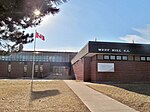University of Toronto Scarborough
The University of Toronto Scarborough, also known as U of T Scarborough or UTSC, is one of the three campuses that make up the tri-campus system of the University of Toronto. Located in Scarborough, Toronto, Ontario, Canada, the campus is set upon suburban parkland in the residential neighbourhood of Highland Creek. It was established in 1964 as Scarborough College, a constituent college of the Faculty of Arts and Science. The college expanded following its designation as an autonomic division of the university in 1972 and gradually became an independent institution. It ranks last in area and enrolment size among the three University of Toronto campuses, the other two being the St. George campus in Downtown Toronto and the University of Toronto Mississauga. Academics of the campus are centred on a variety of undergraduate studies in the disciplines of management, arts and sciences, whilst also hosting limited postgraduate research programs. Its neuroscience program was the first to be offered in the nation. The campus is noted for being the university's sole provider of cooperative education programs, as well as the Bachelor of Business Administration degree. Through affiliation with the adjacent Centennial Science and Technology Centre of Centennial College, it also offers enrolment in joint programs. The campus has traditionally held the annual F. B. Watts Memorial Lectures, which has hosted internationally renowned scholars since 1970. Its nuclear magnetic resonance laboratory was the first of its kind in Canada, allowing the campus to conduct influential research in the environmental sciences. The original building of the campus was internationally acclaimed for its architectural design. The Dan Lang Field, home to the baseball team of the Toronto Varsity Blues, is also situated at the campus.
Excerpt from the Wikipedia article University of Toronto Scarborough (License: CC BY-SA 3.0, Authors).University of Toronto Scarborough
Valley Land Trail, Toronto Scarborough
Geographical coordinates (GPS) Address External links Nearby Places Show on map
Geographical coordinates (GPS)
| Latitude | Longitude |
|---|---|
| N 43.783611111111 ° | E -79.185555555556 ° |
Address
University of Toronto at Scarborough
Valley Land Trail
M1C 1A4 Toronto, Scarborough
Ontario, Canada
Open on Google Maps







